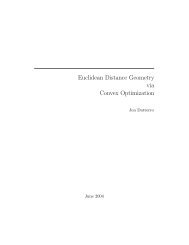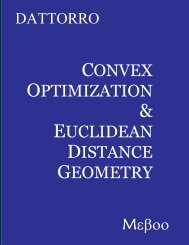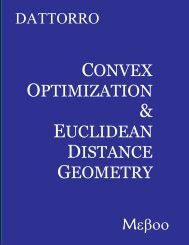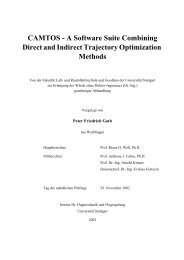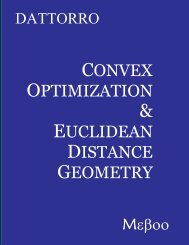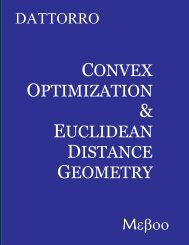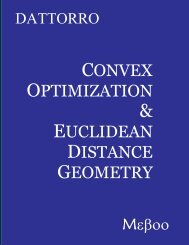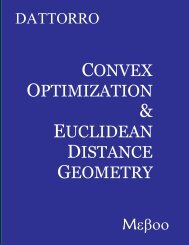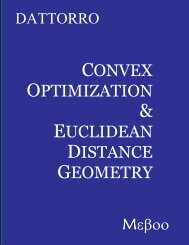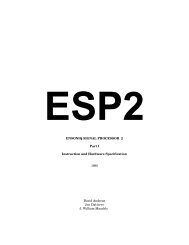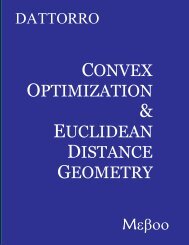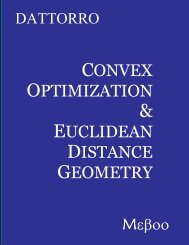- Page 1 and 2:
DATTORROCONVEXOPTIMIZATION&EUCLIDEA
- Page 3 and 4:
Convex Optimization&Euclidean Dista
- Page 5 and 6:
for Jennie Columba♦Antonio♦♦&
- Page 7 and 8:
PreludeThe constant demands of my d
- Page 9 and 10:
Convex Optimization&Euclidean Dista
- Page 11 and 12:
CONVEX OPTIMIZATION & EUCLIDEAN DIS
- Page 13 and 14:
List of Figures1 Overview 191 Orion
- Page 15 and 16:
LIST OF FIGURES 1559 Quadratic func
- Page 17 and 18:
LIST OF FIGURES 17E Projection 5791
- Page 19 and 20:
Chapter 1OverviewConvex Optimizatio
- Page 21 and 22:
ˇx 4ˇx 3ˇx 2Figure 2: Applicatio
- Page 23 and 24:
23Figure 4: This coarsely discretiz
- Page 25 and 26:
ases (biorthogonal expansion). We e
- Page 27 and 28:
27Figure 7: These bees construct a
- Page 29 and 30:
its membership to the EDM cone. The
- Page 31 and 32:
31appendicesProvided so as to be mo
- Page 33 and 34:
Chapter 2Convex geometryConvexity h
- Page 35 and 36:
2.1. CONVEX SET 35Figure 9: A slab
- Page 37 and 38:
2.1. CONVEX SET 372.1.6 empty set v
- Page 39 and 40:
2.1. CONVEX SET 392.1.7.1 Line inte
- Page 41 and 42:
2.1. CONVEX SET 41(a)R 2(b)R 3(c)(d
- Page 43 and 44:
2.1. CONVEX SET 43This theorem in c
- Page 45 and 46:
2.2. VECTORIZED-MATRIX INNER PRODUC
- Page 47 and 48:
2.2. VECTORIZED-MATRIX INNER PRODUC
- Page 49 and 50:
2.2. VECTORIZED-MATRIX INNER PRODUC
- Page 51 and 52:
2.2. VECTORIZED-MATRIX INNER PRODUC
- Page 53 and 54:
2.3. HULLS 53Figure 12: Convex hull
- Page 55 and 56:
2.3. HULLS 55Aaffine hull (drawn tr
- Page 57 and 58:
2.3. HULLS 57The union of relative
- Page 59 and 60:
2.4. HALFSPACE, HYPERPLANE 59of dim
- Page 61 and 62:
2.4. HALFSPACE, HYPERPLANE 61H +ay
- Page 63 and 64:
2.4. HALFSPACE, HYPERPLANE 63Inters
- Page 65 and 66:
2.4. HALFSPACE, HYPERPLANE 65Conver
- Page 67 and 68:
2.4. HALFSPACE, HYPERPLANE 67A 1A 2
- Page 69 and 70:
2.4. HALFSPACE, HYPERPLANE 69tradit
- Page 71 and 72:
2.4. HALFSPACE, HYPERPLANE 71There
- Page 73 and 74:
2.5. SUBSPACE REPRESENTATIONS 732.5
- Page 75 and 76:
2.5. SUBSPACE REPRESENTATIONS 752.5
- Page 77 and 78:
2.6. EXTREME, EXPOSED 77In other wo
- Page 79 and 80:
2.6. EXTREME, EXPOSED 792.6.1 Expos
- Page 81 and 82:
2.7. CONES 812.6.1.3.1 Definition.
- Page 83 and 84:
2.7. CONES 830Figure 24: Boundary o
- Page 85 and 86:
2.7. CONES 852.7.2 Convex coneWe ca
- Page 87 and 88:
2.7. CONES 87Thus the simplest and
- Page 89 and 90:
2.7. CONES 89nomenclature generaliz
- Page 91 and 92:
2.8. CONE BOUNDARY 91Proper cone {0
- Page 93 and 94:
2.8. CONE BOUNDARY 93the same extre
- Page 96 and 97:
96 CHAPTER 2. CONVEX GEOMETRYBCADFi
- Page 98 and 99:
98 CHAPTER 2. CONVEX GEOMETRYThe po
- Page 100 and 101:
100 CHAPTER 2. CONVEX GEOMETRY2.9.0
- Page 102 and 103:
102 CHAPTER 2. CONVEX GEOMETRYwhere
- Page 104 and 105:
104 CHAPTER 2. CONVEX GEOMETRY√2
- Page 106 and 107:
106 CHAPTER 2. CONVEX GEOMETRYwhich
- Page 108 and 109:
108 CHAPTER 2. CONVEX GEOMETRY2.9.2
- Page 110:
110 CHAPTER 2. CONVEX GEOMETRYA con
- Page 115 and 116:
2.9. POSITIVE SEMIDEFINITE (PSD) CO
- Page 117 and 118:
2.9. POSITIVE SEMIDEFINITE (PSD) CO
- Page 119 and 120:
2.9. POSITIVE SEMIDEFINITE (PSD) CO
- Page 121 and 122:
2.10. CONIC INDEPENDENCE (C.I.) 121
- Page 123 and 124:
2.10. CONIC INDEPENDENCE (C.I.) 123
- Page 125 and 126:
2.10. CONIC INDEPENDENCE (C.I.) 125
- Page 127 and 128:
2.12. CONVEX POLYHEDRA 127It follow
- Page 129 and 130:
2.12. CONVEX POLYHEDRA 129Coefficie
- Page 131 and 132:
2.12. CONVEX POLYHEDRA 1312.12.3 Un
- Page 133 and 134:
2.12. CONVEX POLYHEDRA 133
- Page 135 and 136:
2.13. DUAL CONE & GENERALIZED INEQU
- Page 137 and 138:
2.13. DUAL CONE & GENERALIZED INEQU
- Page 139 and 140:
2.13. DUAL CONE & GENERALIZED INEQU
- Page 141 and 142:
2.13. DUAL CONE & GENERALIZED INEQU
- Page 143 and 144:
2.13. DUAL CONE & GENERALIZED INEQU
- Page 145 and 146:
2.13. DUAL CONE & GENERALIZED INEQU
- Page 147 and 148:
2.13. DUAL CONE & GENERALIZED INEQU
- Page 149 and 150:
2.13. DUAL CONE & GENERALIZED INEQU
- Page 151 and 152:
2.13. DUAL CONE & GENERALIZED INEQU
- Page 153 and 154:
2.13. DUAL CONE & GENERALIZED INEQU
- Page 155 and 156:
2.13. DUAL CONE & GENERALIZED INEQU
- Page 157 and 158:
2.13. DUAL CONE & GENERALIZED INEQU
- Page 159 and 160:
2.13. DUAL CONE & GENERALIZED INEQU
- Page 161 and 162:
2.13. DUAL CONE & GENERALIZED INEQU
- Page 163 and 164:
2.13. DUAL CONE & GENERALIZED INEQU
- Page 165 and 166:
2.13. DUAL CONE & GENERALIZED INEQU
- Page 167 and 168:
2.13. DUAL CONE & GENERALIZED INEQU
- Page 169 and 170:
2.13. DUAL CONE & GENERALIZED INEQU
- Page 171 and 172:
2.13. DUAL CONE & GENERALIZED INEQU
- Page 173 and 174:
2.13. DUAL CONE & GENERALIZED INEQU
- Page 175 and 176:
2.13. DUAL CONE & GENERALIZED INEQU
- Page 177 and 178:
2.13. DUAL CONE & GENERALIZED INEQU
- Page 179 and 180:
2.13. DUAL CONE & GENERALIZED INEQU
- Page 181 and 182:
2.13. DUAL CONE & GENERALIZED INEQU
- Page 183 and 184:
Chapter 3Geometry of convex functio
- Page 185 and 186:
3.1. CONVEX FUNCTION 185f 1 (x)f 2
- Page 187 and 188:
3.1. CONVEX FUNCTION 1873.1.3 norm
- Page 189 and 190:
3.1. CONVEX FUNCTION 189where the n
- Page 191 and 192:
3.1. CONVEX FUNCTION 191where k ∈
- Page 193 and 194:
3.1. CONVEX FUNCTION 193f(z)Az 2z 1
- Page 195 and 196:
3.1. CONVEX FUNCTION 195{a T z 1 +
- Page 197 and 198:
3.1. CONVEX FUNCTION 197When an epi
- Page 199 and 200:
3.1. CONVEX FUNCTION 199orthonormal
- Page 201 and 202:
3.1. CONVEX FUNCTION 201[30,1.1] Ex
- Page 203 and 204:
3.1. CONVEX FUNCTION 20321.510.5Y 2
- Page 205 and 206:
3.1. CONVEX FUNCTION 2053.1.8.0.1 E
- Page 207 and 208:
3.1. CONVEX FUNCTION 207This equiva
- Page 209 and 210:
3.1. CONVEX FUNCTION 2093.1.8.1 mon
- Page 211 and 212:
3.1. CONVEX FUNCTION 211[ Yt]∈ ep
- Page 213 and 214:
3.1. CONVEX FUNCTION 213→Y −Xwh
- Page 215 and 216:
3.2. MATRIX-VALUED CONVEX FUNCTION
- Page 217 and 218:
3.2. MATRIX-VALUED CONVEX FUNCTION
- Page 219 and 220:
3.2. MATRIX-VALUED CONVEX FUNCTION
- Page 221 and 222:
3.3. QUASICONVEX 221A quasiconcave
- Page 223 and 224:
3.4. SALIENT PROPERTIES 2236.A nonn
- Page 225 and 226:
Chapter 4Semidefinite programmingPr
- Page 227 and 228:
4.1. CONIC PROBLEM 227where K is a
- Page 229 and 230:
4.1. CONIC PROBLEM 229C0PΓ 1Γ 2S+
- Page 231 and 232:
4.1. CONIC PROBLEM 231faces of S 3
- Page 233 and 234:
4.1. CONIC PROBLEM 2334.1.1.3 Previ
- Page 235 and 236:
4.2. FRAMEWORK 235Equivalently, pri
- Page 237 and 238:
4.2. FRAMEWORK 237is positive semid
- Page 239 and 240:
4.2. FRAMEWORK 239Optimal value of
- Page 241 and 242:
4.2. FRAMEWORK 2414.2.3.0.2 Example
- Page 243 and 244:
4.2. FRAMEWORK 243where δ is the m
- Page 245 and 246:
4.2. FRAMEWORK 2454.2.3.0.3 Example
- Page 247 and 248:
4.3. RANK REDUCTION 2474.3 Rank red
- Page 249 and 250:
4.3. RANK REDUCTION 249A rank-reduc
- Page 251 and 252:
4.3. RANK REDUCTION 251(t ⋆ i)
- Page 253 and 254:
4.3. RANK REDUCTION 2534.3.3.0.1 Ex
- Page 255 and 256:
4.3. RANK REDUCTION 2554.3.3.0.2 Ex
- Page 257 and 258:
4.4. RANK-CONSTRAINED SEMIDEFINITE
- Page 259 and 260:
4.4. RANK-CONSTRAINED SEMIDEFINITE
- Page 261 and 262:
4.4. RANK-CONSTRAINED SEMIDEFINITE
- Page 263 and 264:
4.4. RANK-CONSTRAINED SEMIDEFINITE
- Page 265 and 266:
4.4. RANK-CONSTRAINED SEMIDEFINITE
- Page 267 and 268:
4.4. RANK-CONSTRAINED SEMIDEFINITE
- Page 269 and 270:
4.4. RANK-CONSTRAINED SEMIDEFINITE
- Page 271 and 272:
4.4. RANK-CONSTRAINED SEMIDEFINITE
- Page 273 and 274:
4.4. RANK-CONSTRAINED SEMIDEFINITE
- Page 275 and 276:
4.4. RANK-CONSTRAINED SEMIDEFINITE
- Page 277 and 278:
4.4. RANK-CONSTRAINED SEMIDEFINITE
- Page 279 and 280:
4.4. RANK-CONSTRAINED SEMIDEFINITE
- Page 281 and 282:
4.4. RANK-CONSTRAINED SEMIDEFINITE
- Page 283 and 284:
4.4. RANK-CONSTRAINED SEMIDEFINITE
- Page 285 and 286:
4.4. RANK-CONSTRAINED SEMIDEFINITE
- Page 287 and 288:
4.4. RANK-CONSTRAINED SEMIDEFINITE
- Page 289 and 290:
Chapter 5Euclidean Distance MatrixT
- Page 291 and 292:
5.2. FIRST METRIC PROPERTIES 291cor
- Page 293 and 294:
5.3. ∃ FIFTH EUCLIDEAN METRIC PRO
- Page 295 and 296:
5.3. ∃ FIFTH EUCLIDEAN METRIC PRO
- Page 297 and 298:
5.4. EDM DEFINITION 297The collecti
- Page 299 and 300:
5.4. EDM DEFINITION 2995.4.2 Gram-f
- Page 301 and 302:
5.4. EDM DEFINITION 301D ∈ EDM N
- Page 303 and 304:
5.4. EDM DEFINITION 3035.4.2.2.1 Ex
- Page 305 and 306:
5.4. EDM DEFINITION 305ten affine e
- Page 307 and 308:
5.4. EDM DEFINITION 307spheres:Then
- Page 309 and 310:
5.4. EDM DEFINITION 309By eliminati
- Page 311 and 312:
5.4. EDM DEFINITION 311whereΦ ij =
- Page 313 and 314:
5.4. EDM DEFINITION 3135.4.2.2.5 De
- Page 315 and 316:
5.4. EDM DEFINITION 315105ˇx 4ˇx
- Page 317 and 318:
5.4. EDM DEFINITION 317corrected by
- Page 319 and 320:
5.4. EDM DEFINITION 319aptly be app
- Page 321 and 322:
5.4. EDM DEFINITION 321As before, a
- Page 323 and 324:
5.4. EDM DEFINITION 323where ([√t
- Page 325 and 326:
5.4. EDM DEFINITION 325because (A.3
- Page 327 and 328:
5.5. INVARIANCE 3275.5.1.0.1 Exampl
- Page 329 and 330:
5.6. INJECTIVITY OF D & UNIQUE RECO
- Page 331 and 332:
5.6. INJECTIVITY OF D & UNIQUE RECO
- Page 333 and 334:
5.6. INJECTIVITY OF D & UNIQUE RECO
- Page 335 and 336:
5.7. EMBEDDING IN AFFINE HULL 3355.
- Page 337 and 338:
5.7. EMBEDDING IN AFFINE HULL 337Fo
- Page 339 and 340:
5.7. EMBEDDING IN AFFINE HULL 3395.
- Page 341 and 342:
5.8. EUCLIDEAN METRIC VERSUS MATRIX
- Page 343 and 344:
5.8. EUCLIDEAN METRIC VERSUS MATRIX
- Page 345 and 346:
5.8. EUCLIDEAN METRIC VERSUS MATRIX
- Page 347 and 348:
5.8. EUCLIDEAN METRIC VERSUS MATRIX
- Page 349 and 350:
5.9. BRIDGE: CONVEX POLYHEDRA TO ED
- Page 351 and 352:
5.9. BRIDGE: CONVEX POLYHEDRA TO ED
- Page 353 and 354:
5.9. BRIDGE: CONVEX POLYHEDRA TO ED
- Page 355 and 356:
5.9. BRIDGE: CONVEX POLYHEDRA TO ED
- Page 357 and 358:
5.10. EDM-ENTRY COMPOSITION 357(ii)
- Page 359 and 360: 5.11. EDM INDEFINITENESS 3595.11.1
- Page 361 and 362: 5.11. EDM INDEFINITENESS 361(confer
- Page 363 and 364: 5.11. EDM INDEFINITENESS 363we have
- Page 365 and 366: 5.11. EDM INDEFINITENESS 365For pre
- Page 367 and 368: 5.12. LIST RECONSTRUCTION 367where
- Page 369 and 370: 5.12. LIST RECONSTRUCTION 369(a)(c)
- Page 371 and 372: 5.13. RECONSTRUCTION EXAMPLES 371D
- Page 373 and 374: 5.13. RECONSTRUCTION EXAMPLES 373Th
- Page 375 and 376: 5.13. RECONSTRUCTION EXAMPLES 375wh
- Page 377 and 378: 5.14. FIFTH PROPERTY OF EUCLIDEAN M
- Page 379 and 380: 5.14. FIFTH PROPERTY OF EUCLIDEAN M
- Page 381 and 382: 5.14. FIFTH PROPERTY OF EUCLIDEAN M
- Page 383 and 384: 5.14. FIFTH PROPERTY OF EUCLIDEAN M
- Page 385 and 386: 5.14. FIFTH PROPERTY OF EUCLIDEAN M
- Page 387 and 388: Chapter 6EDM coneFor N > 3, the con
- Page 389 and 390: 6.1. DEFINING EDM CONE 3896.1 Defin
- Page 391 and 392: 6.2. POLYHEDRAL BOUNDS 391This cone
- Page 393 and 394: 6.3.√EDM CONE IS NOT CONVEX 393N
- Page 395 and 396: 6.4. A GEOMETRY OF COMPLETION 3956.
- Page 397 and 398: 6.4. A GEOMETRY OF COMPLETION 397(a
- Page 399 and 400: 6.4. A GEOMETRY OF COMPLETION 399Fi
- Page 401 and 402: 6.5. EDM DEFINITION IN 11 T 401and
- Page 403 and 404: 6.5. EDM DEFINITION IN 11 T 403then
- Page 405 and 406: 6.5. EDM DEFINITION IN 11 T 4056.5.
- Page 407 and 408: 6.5. EDM DEFINITION IN 11 T 407D =
- Page 409: 6.6. CORRESPONDENCE TO PSD CONE S N
- Page 413 and 414: 6.6. CORRESPONDENCE TO PSD CONE S N
- Page 415 and 416: 6.7. VECTORIZATION & PROJECTION INT
- Page 417 and 418: 6.7. VECTORIZATION & PROJECTION INT
- Page 419 and 420: 6.8. DUAL EDM CONE 419When the Fins
- Page 421 and 422: 6.8. DUAL EDM CONE 421Proof. First,
- Page 423 and 424: 6.8. DUAL EDM CONE 423EDM 2 = S 2 h
- Page 425 and 426: 6.8. DUAL EDM CONE 425whose veracit
- Page 427 and 428: 6.8. DUAL EDM CONE 4276.8.1.3.1 Exe
- Page 429 and 430: 6.8. DUAL EDM CONE 429has dual affi
- Page 431 and 432: 6.8. DUAL EDM CONE 4316.8.1.7 Schoe
- Page 433 and 434: 6.9. THEOREM OF THE ALTERNATIVE 433
- Page 435 and 436: 6.10. POSTSCRIPT 435When D is an ED
- Page 437 and 438: Chapter 7Proximity problemsIn summa
- Page 439 and 440: In contrast, order of projection on
- Page 441 and 442: 441HS N h0EDM NK = S N h ∩ R N×N
- Page 443 and 444: 4437.0.3 Problem approachProblems t
- Page 445 and 446: 7.1. FIRST PREVALENT PROBLEM: 445fi
- Page 447 and 448: 7.1. FIRST PREVALENT PROBLEM: 4477.
- Page 449 and 450: 7.1. FIRST PREVALENT PROBLEM: 449di
- Page 451 and 452: 7.1. FIRST PREVALENT PROBLEM: 4517.
- Page 453 and 454: 7.1. FIRST PREVALENT PROBLEM: 453wh
- Page 455 and 456: 7.1. FIRST PREVALENT PROBLEM: 455Th
- Page 457 and 458: 7.2. SECOND PREVALENT PROBLEM: 457O
- Page 459 and 460: 7.2. SECOND PREVALENT PROBLEM: 459S
- Page 461 and 462:
7.2. SECOND PREVALENT PROBLEM: 461r
- Page 463 and 464:
7.2. SECOND PREVALENT PROBLEM: 463c
- Page 465 and 466:
7.2. SECOND PREVALENT PROBLEM: 4657
- Page 467 and 468:
7.3. THIRD PREVALENT PROBLEM: 467fo
- Page 469 and 470:
7.3. THIRD PREVALENT PROBLEM: 469a
- Page 471 and 472:
7.3. THIRD PREVALENT PROBLEM: 4717.
- Page 473 and 474:
7.3. THIRD PREVALENT PROBLEM: 4737.
- Page 475 and 476:
7.3. THIRD PREVALENT PROBLEM: 475Ou
- Page 478 and 479:
478 CHAPTER 7. PROXIMITY PROBLEMSth
- Page 480 and 481:
480 APPENDIX A. LINEAR ALGEBRAA.1.1
- Page 482 and 483:
482 APPENDIX A. LINEAR ALGEBRAA.1.2
- Page 484 and 485:
484 APPENDIX A. LINEAR ALGEBRAonly
- Page 486 and 487:
486 APPENDIX A. LINEAR ALGEBRA(AB)
- Page 488 and 489:
488 APPENDIX A. LINEAR ALGEBRAA.3.1
- Page 490 and 491:
490 APPENDIX A. LINEAR ALGEBRAFor A
- Page 492 and 493:
492 APPENDIX A. LINEAR ALGEBRADiago
- Page 494 and 495:
494 APPENDIX A. LINEAR ALGEBRAFor A
- Page 496 and 497:
496 APPENDIX A. LINEAR ALGEBRAA.3.1
- Page 498 and 499:
498 APPENDIX A. LINEAR ALGEBRAA.4 S
- Page 500 and 501:
500 APPENDIX A. LINEAR ALGEBRAA.4.0
- Page 502 and 503:
502 APPENDIX A. LINEAR ALGEBRAA.5 e
- Page 504 and 505:
504 APPENDIX A. LINEAR ALGEBRAs i w
- Page 506 and 507:
506 APPENDIX A. LINEAR ALGEBRAA.6.2
- Page 508 and 509:
508 APPENDIX A. LINEAR ALGEBRAΣq 2
- Page 510 and 511:
510 APPENDIX A. LINEAR ALGEBRAA.7 Z
- Page 512 and 513:
512 APPENDIX A. LINEAR ALGEBRAThere
- Page 514 and 515:
514 APPENDIX A. LINEAR ALGEBRAA.7.5
- Page 516 and 517:
516 APPENDIX A. LINEAR ALGEBRA
- Page 518 and 519:
518 APPENDIX B. SIMPLE MATRICESB.1
- Page 520 and 521:
520 APPENDIX B. SIMPLE MATRICESProo
- Page 522 and 523:
522 APPENDIX B. SIMPLE MATRICESB.1.
- Page 524 and 525:
524 APPENDIX B. SIMPLE MATRICESN(u
- Page 526 and 527:
526 APPENDIX B. SIMPLE MATRICESDue
- Page 528 and 529:
528 APPENDIX B. SIMPLE MATRICESB.4.
- Page 530 and 531:
530 APPENDIX B. SIMPLE MATRICEShas
- Page 532 and 533:
532 APPENDIX B. SIMPLE MATRICESFigu
- Page 534 and 535:
534 APPENDIX B. SIMPLE MATRICESB.5.
- Page 536 and 537:
536 APPENDIX C. SOME ANALYTICAL OPT
- Page 538 and 539:
538 APPENDIX C. SOME ANALYTICAL OPT
- Page 540 and 541:
540 APPENDIX C. SOME ANALYTICAL OPT
- Page 542 and 543:
542 APPENDIX C. SOME ANALYTICAL OPT
- Page 544 and 545:
544 APPENDIX C. SOME ANALYTICAL OPT
- Page 546 and 547:
546 APPENDIX C. SOME ANALYTICAL OPT
- Page 548 and 549:
548 APPENDIX C. SOME ANALYTICAL OPT
- Page 550 and 551:
550 APPENDIX D. MATRIX CALCULUSThe
- Page 552 and 553:
552 APPENDIX D. MATRIX CALCULUSGrad
- Page 554 and 555:
554 APPENDIX D. MATRIX CALCULUSBeca
- Page 556 and 557:
556 APPENDIX D. MATRIX CALCULUSwhic
- Page 558 and 559:
558 APPENDIX D. MATRIX CALCULUS⎡
- Page 560 and 561:
560 APPENDIX D. MATRIX CALCULUS→Y
- Page 562 and 563:
562 APPENDIX D. MATRIX CALCULUSD.1.
- Page 564 and 565:
564 APPENDIX D. MATRIX CALCULUSwhic
- Page 566 and 567:
566 APPENDIX D. MATRIX CALCULUSIn t
- Page 568 and 569:
568 APPENDIX D. MATRIX CALCULUSD.1.
- Page 570 and 571:
570 APPENDIX D. MATRIX CALCULUSD.2
- Page 572 and 573:
572 APPENDIX D. MATRIX CALCULUSalge
- Page 574 and 575:
574 APPENDIX D. MATRIX CALCULUStrac
- Page 576 and 577:
576 APPENDIX D. MATRIX CALCULUSD.2.
- Page 578 and 579:
578 APPENDIX D. MATRIX CALCULUS
- Page 580 and 581:
580 APPENDIX E. PROJECTIONThe follo
- Page 582 and 583:
582 APPENDIX E. PROJECTIONFor matri
- Page 584 and 585:
584 APPENDIX E. PROJECTION(⇐) To
- Page 586 and 587:
586 APPENDIX E. PROJECTIONNonorthog
- Page 588 and 589:
588 APPENDIX E. PROJECTIONE.2.0.0.1
- Page 590 and 591:
590 APPENDIX E. PROJECTIONE.3.2Orth
- Page 592 and 593:
592 APPENDIX E. PROJECTIONE.3.5Unif
- Page 594 and 595:
594 APPENDIX E. PROJECTIONE.4 Algeb
- Page 596 and 597:
596 APPENDIX E. PROJECTIONa ∗ 2K
- Page 598 and 599:
598 APPENDIX E. PROJECTIONwhere Y =
- Page 600 and 601:
600 APPENDIX E. PROJECTION(B.4.2).
- Page 602 and 603:
602 APPENDIX E. PROJECTIONis a nono
- Page 604 and 605:
604 APPENDIX E. PROJECTIONE.6.4.1Or
- Page 606 and 607:
606 APPENDIX E. PROJECTIONq i q T i
- Page 608 and 609:
608 APPENDIX E. PROJECTIONThe test
- Page 610 and 611:
610 APPENDIX E. PROJECTIONPerpendic
- Page 612 and 613:
612 APPENDIX E. PROJECTIONE.8 Range
- Page 614 and 615:
614 APPENDIX E. PROJECTIONAs for su
- Page 616 and 617:
616 APPENDIX E. PROJECTIONWith refe
- Page 618 and 619:
618 APPENDIX E. PROJECTIONProjectio
- Page 620 and 621:
620 APPENDIX E. PROJECTIONE.9.2.2.2
- Page 622 and 623:
622 APPENDIX E. PROJECTIONThe foreg
- Page 624 and 625:
624 APPENDIX E. PROJECTION❇❇❇
- Page 626 and 627:
626 APPENDIX E. PROJECTIONE.10 Alte
- Page 628 and 629:
628 APPENDIX E. PROJECTIONbH 1H 2P
- Page 630 and 631:
630 APPENDIX E. PROJECTIONa(a){y |
- Page 632 and 633:
632 APPENDIX E. PROJECTION(a feasib
- Page 634 and 635:
634 APPENDIX E. PROJECTIONwhile, th
- Page 636 and 637:
636 APPENDIX E. PROJECTIONE.10.2.1.
- Page 638 and 639:
638 APPENDIX E. PROJECTION10 0dist(
- Page 640 and 641:
640 APPENDIX E. PROJECTIONE.10.3.1D
- Page 642 and 643:
642 APPENDIX E. PROJECTIONE 3K ⊥
- Page 644 and 645:
644 APPENDIX E. PROJECTION
- Page 646 and 647:
646 APPENDIX F. MATLAB PROGRAMSif n
- Page 648 and 649:
648 APPENDIX F. MATLAB PROGRAMSend%
- Page 650 and 651:
650 APPENDIX F. MATLAB PROGRAMSF.1.
- Page 652 and 653:
652 APPENDIX F. MATLAB PROGRAMScoun
- Page 654 and 655:
654 APPENDIX F. MATLAB PROGRAMSF.3
- Page 656 and 657:
656 APPENDIX F. MATLAB PROGRAMSF.3.
- Page 658 and 659:
658 APPENDIX F. MATLAB PROGRAMS% so
- Page 660 and 661:
660 APPENDIX F. MATLAB PROGRAMS% tr
- Page 662 and 663:
662 APPENDIX F. MATLAB PROGRAMSF.4.
- Page 664 and 665:
664 APPENDIX F. MATLAB PROGRAMSbrea
- Page 666 and 667:
666 APPENDIX F. MATLAB PROGRAMSwhil
- Page 668 and 669:
668 APPENDIX F. MATLAB PROGRAMSF.7
- Page 670 and 671:
670 APPENDIX F. MATLAB PROGRAMS
- Page 672 and 673:
672 APPENDIX G. NOTATION AND A FEW
- Page 674 and 675:
674 APPENDIX G. NOTATION AND A FEW
- Page 676 and 677:
676 APPENDIX G. NOTATION AND A FEW
- Page 678 and 679:
678 APPENDIX G. NOTATION AND A FEW
- Page 680 and 681:
680 APPENDIX G. NOTATION AND A FEW
- Page 682 and 683:
682 APPENDIX G. NOTATION AND A FEW
- Page 684 and 685:
684 APPENDIX G. NOTATION AND A FEW
- Page 686 and 687:
686 APPENDIX G. NOTATION AND A FEW
- Page 688 and 689:
688 BIBLIOGRAPHY[7] Abdo Y. Alfakih
- Page 690 and 691:
690 BIBLIOGRAPHY[27] Aharon Ben-Tal
- Page 692 and 693:
692 BIBLIOGRAPHY[48] Lev M. Brègma
- Page 694 and 695:
694 BIBLIOGRAPHY[67] Joel Dawson, S
- Page 696 and 697:
696 BIBLIOGRAPHY[85] Alan Edelman,
- Page 698 and 699:
698 BIBLIOGRAPHY[102] Philip E. Gil
- Page 700 and 701:
700 BIBLIOGRAPHYWeiss, editors, Pol
- Page 702 and 703:
702 BIBLIOGRAPHY[146] Jean-Baptiste
- Page 704 and 705:
704 BIBLIOGRAPHY[168] Jean B. Lasse
- Page 706 and 707:
706 BIBLIOGRAPHY[189] Rudolf Mathar
- Page 708 and 709:
708 BIBLIOGRAPHY[211] M. L. Overton
- Page 710 and 711:
710 BIBLIOGRAPHY[229] C. K. Rushfor
- Page 712 and 713:
712 BIBLIOGRAPHY[252] Jos F. Sturm
- Page 714 and 715:
714 BIBLIOGRAPHY[274] È. B. Vinber
- Page 716 and 717:
[294] Yinyu Ye. Semidefinite progra
- Page 718 and 719:
718 INDEXobtuse, 62positive semidef
- Page 720 and 721:
720 INDEXelliptope, 642orthant, 177
- Page 722 and 723:
722 INDEXdistancegeometry, 20, 317m
- Page 724 and 725:
724 INDEX-dimensional, 37, 89rank,
- Page 726 and 727:
726 INDEXGram form, 331is, 674isedm
- Page 728 and 729:
728 INDEXdiscretized, 152, 431in su
- Page 730 and 731:
730 INDEXboundary, 115dimension, 10
- Page 732 and 733:
732 INDEXlinear operator, 587, 591,
- Page 734 and 735:
734 INDEXlargest entries, 188monoto
- Page 736:
736 INDEXsimilarity, 606translation



